Why Are Lexus Models Suddenly Top Targets for Car Thieves?
If you own a Lexus, especially one of the recent models, you might want to pay extra attention to your car’s security. According to the latest government data, five Lexus models have landed in the top ten most likely to be stolen in 2024. The Lexus ES 300 leads the pack, with an astonishing one in 30 chance of being stolen. Right behind it are the Lexus RX 450 and the Mercedes GLS, both with a one in 39 chance. Other Lexus models like the LC 500, UX 250, and NX 300 also make the list, showing that thieves are increasingly targeting these higher-value, slightly older vehicles.
So, what’s driving this trend? Experts point to a combination of factors. Lexus vehicles, known for their luxury and reliability, are in high demand not just in the UK but also overseas. This demand fuels a thriving export market for stolen premium cars. Criminals have become more sophisticated, often targeting models with perceived vulnerabilities or those lacking the latest security updates.
How Does This Compare to Other Popular Cars Like the Ford Fiesta?
You might assume that the most popular cars are the most likely to be stolen. While the Ford Fiesta tops the charts for the sheer number of thefts—over 4,700 last year—it’s a different story when you look at theft rates relative to how many are on the road. The Fiesta, despite being the UK’s best-selling used car, ranks a distant 312th in terms of theft likelihood. That means your odds of losing a Fiesta to thieves are much lower than if you own a Lexus ES 300 or RX 450.
This shift highlights a key point: thieves are getting choosier. Rather than going after the most common cars, they’re targeting models that fetch higher prices on the black market, either whole or as parts.
What’s Being Done to Protect High-Risk Vehicles?
Manufacturers aren’t sitting idly by. Lexus, for example, has invested over £10 million in anti-theft measures, including offering selected customers a free Tracker vehicle location service. The results? A reported 96% recovery rate for stolen vehicles equipped with this technology. Tracker installation is now available as an option for certain models, giving owners extra peace of mind.
Jaguar Land Rover (JLR) faced a similar problem, with the Range Rover once being a favorite among thieves. After a spate of thefts, JLR rolled out significant security software updates across its lineup. The payoff is clear: the Range Rover has dropped to 52nd on the list of most likely stolen cars, now sitting behind other premium SUVs like the Bentley Bentayga and the Mercedes GLS.
Why Are Some Brands Like Abarth and Lexus More Vulnerable?
It’s not just Lexus feeling the heat. Abarth, a niche performance brand, is now the most likely marque to be stolen, with one in 116 vehicles targeted. The Abarth 595, in particular, faces a one in 87 chance of theft. These numbers reflect a broader trend: thieves are increasingly going after cars that are either valuable, rare, or both.
According to Clive Wain, head of police liaison at Tracker, the export market for premium vehicles is a major driver. Many stolen cars are intercepted at docksides, bound for overseas buyers. Until this demand is curbed, recovery efforts will remain a constant battle.
Are Thieves Stealing Cars for Parts or for Export?
It depends on the model. Mark Silvester, a crime prevention specialist with West Midlands Police, notes that cars like the Abarth 595 and Ford Fiesta are often stolen to be broken down for parts. These “chop shops” dismantle vehicles quickly, making recovery difficult. On the other hand, premium models like Lexus and Range Rover are more likely to be shipped abroad, where they command top dollar.
Police are making progress, though. More stolen cars are being identified, and authorities are cracking down on illegal chop shops. Still, vigilance remains key for owners of high-risk vehicles.
What Can You Do to Protect Your Car Right Now?
If you drive a Lexus, Abarth, or any other car that’s become a hot target, there are practical steps you can take. First, make sure your vehicle is serviced at a main dealer or reputable garage with access to the latest security software updates. This can close off vulnerabilities that thieves exploit.
Consider investing in a vehicle tracking system, especially if your manufacturer offers one. Physical deterrents like steering wheel locks, immobilizers, and even simple habits—like parking in well-lit, busy areas—can make a real difference. And don’t underestimate the value of community: neighborhood watch groups and shared security alerts can help everyone stay one step ahead.
The big takeaway? Car security isn’t about perfection—it’s about smarter adjustments. Start with one change this week, and you’ll likely spot the difference by month’s end.

